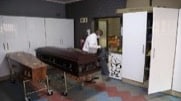Load shedding is proving to be a particular problem for funeral parlours.
Funeral homes have had to invest heavily in generators to keep buildings safe and bodies cold, particularly during the recent heatwaves.
Longer periods of no power and temperatures recently exceeding 40°C in some areas put particular stresses on mortuaries and funeral homes.
The South African Funeral Practitioners Association raised concerns about rapidly decaying bodies due to warm mortuary fridges. People were urged to bury their loved ones within four days.
Doves, one of the country’s largest funeral companies, has managed to keep mortuary fridges cool enough, but the additional costs have grown with lengthier episodes of load shedding.
Doves’ 128 branches in South Africa have been equipped with generators and some with Uninterruptible Power Supply (UPS) systems.
When load shedding was only two hours at a time, Doves could maintain cool temperatures in its mortuary fridges without generators.
With power cuts of four hours, generators work hard to slow decomposition.
CEO Jodene Smith told News24: ‘And it’s not only the cost of the diesel, but it’s also the maintenance of the generators as well’. Smith said operational costs had soared since the need arose to equip every branch with a generator.
Criminals have also used the cover of blackouts to rob funeral homes of equipment.
‘We’ve had theft of our computers, laptops and cables. They go as far as stealing the washbasins, literally whatever they can get their hands on’, Smith said.
These increased costs have ultimately made funerals more expensive, according to Minki Rasenyalo, Doves’ executive director.
‘It does [make funerals more expensive]. Remember, when your operational costs are rising, someone has to carry that cost, and unfortunately, it ends up being the consumer.’
[Photo: Reuters]

